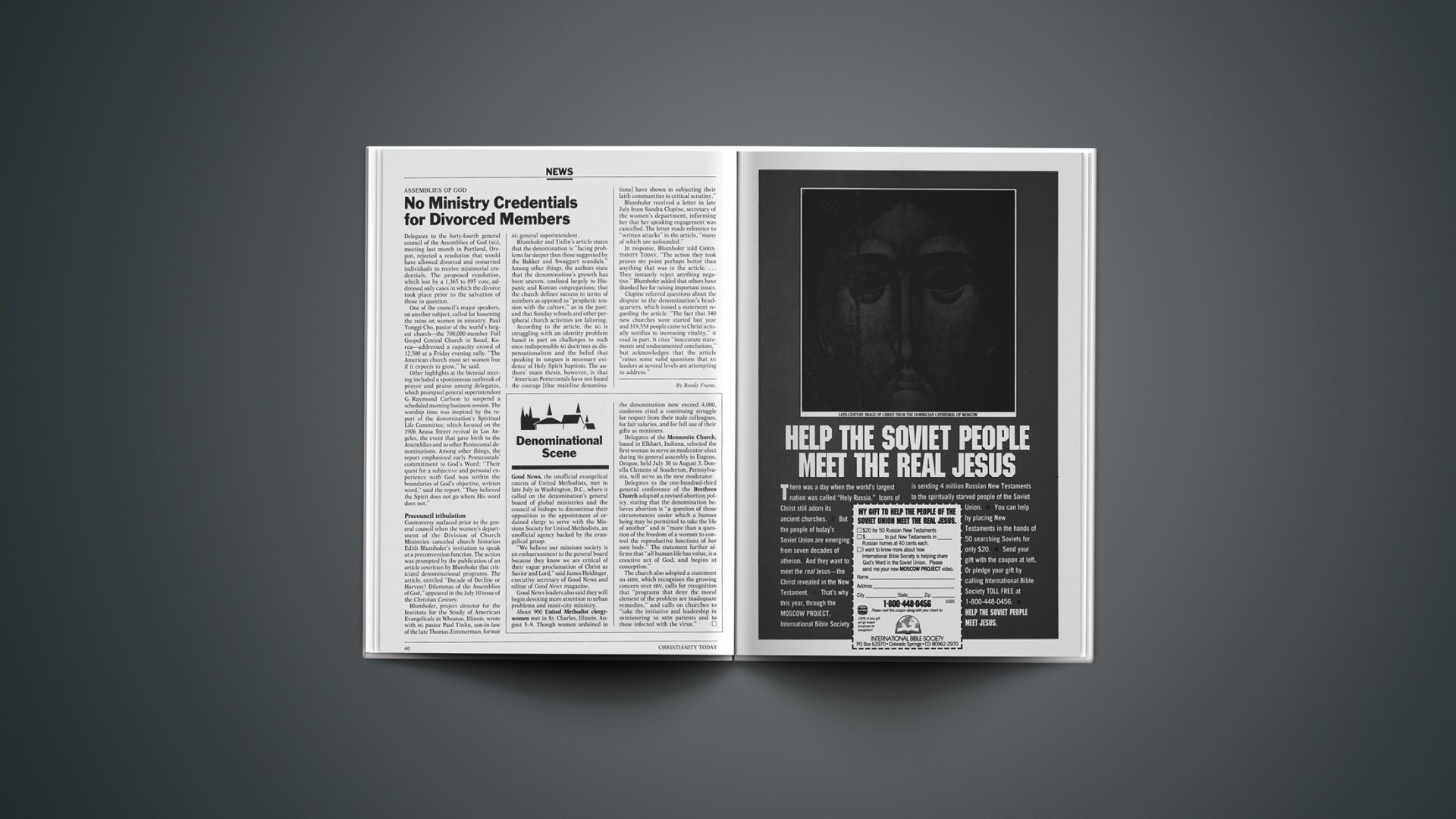Delegates to the forty-fourth general council of the Assemblies of God (AG), meeting last month in Portland, Oregon, rejected a resolution that would have allowed divorced and remarried individuals to receive ministerial credentials. The proposed resolution, which lost by a 1,365 to 895 vote, addressed only cases in which the divorce took place prior to the salvation of those in question.
One of the council’s major speakers, on another subject, called for loosening the reins on women in ministry. Paul Yonggi Cho, pastor of the world’s largest church—the 700,000-member Full Gospel Central Church in Seoul, Korea—addressed a capacity crowd of 12,500 at a Friday evening rally. “The American church must set women free if it expects to grow,” he said.
Other highlights at the biennial meeting included a spontaneous outbreak of prayer and praise among delegates, which prompted general superintendent G. Raymond Carlson to suspend a scheduled morning business session. The worship time was inspired by the report of the denomination’s Spiritual Life Committee, which focused on the 1906 Azusa Street revival in Los Angeles, the event that gave birth to the Assemblies and to other Pentecostal denominations. Among other things, the report emphasized early Pentecostals’ commitment to God’s Word: “Their quest for a subjective and personal experience with God was within the boundaries of God’s objective, written word,” said the report. “They believed the Spirit does not go where His word does not.”
Precouncil Tribulation
Controversy surfaced prior to the general council when the women’s department of the Division of Church Ministries canceled church historian Edith Blumhofer’s invitation to speak at a preconvention function. The action was prompted by the publication of an article cowritten by Blumhofer that criticized denominational programs. The article, entitled “Decade of Decline or Harvest? Dilemmas of the Assemblies of God,” appeared in the July 10 issue of the Christian Century.
Blumhofer, project director for the Institute for the Study of American Evangelicals in Wheaton, Illinois, wrote with AG pastor Paul Tinlin, son-in-law of the late Thomas Zimmerman, former AG general superintendent.
Blumhofer and Tinlin’s article states that the denomination is “facing problems far deeper then those suggested by the Bakker and Swaggart scandals.” Among other things, the authors state that the denomination’s growth has been uneven, confined largely to Hispanic and Korean congregations; that the church defines success in terms of numbers as opposed to “prophetic tension with the culture,” as in the past; and that Sunday schools and other peripheral church activities are faltering.
According to the article, the AG is struggling with an identity problem based in part on challenges to such once-indispensable AG doctrines as dispensationalism and the belief that speaking in tongues is necessary evidence of Holy Spirit baptism. The authors’ main thesis, however, is that “American Pentecostals have not found the courage [that mainline denominations] have shown in subjecting their faith communities to critical scrutiny.”
Blumhofer received a letter in late July from Sandra Clopine, secretary of the women’s department, informing her that her speaking engagement was cancelled. The letter made reference to “written attacks” in the article, “many of which are unfounded.”
In response, Blumhofer told CHRISTIANITY TODAY, “The action they took proves my point perhaps better than anything that was in the article.… They instantly reject anything negative.” Blumhofer added that others have thanked her for raising important issues.
Clopine referred questions about the dispute to the denomination’s headquarters, which issued a statement regarding the article. “The fact that 340 new churches were started last year and 319,558 people came to Christ actually testifies to increasing vitality,” it read in part. It cites “inaccurate statements and undocumented conclusions,” but acknowledges that the article “raises some valid questions that AG leaders at several levels are attempting to address.”
By Randy Frame.
Denominational Scene
Good News, the unofficial evangelical caucus of United Methodists, met in late July in Washington, D.C., where it called on the denomination’s general board of global ministries and the council of bishops to discontinue their opposition to the appointment of ordained clergy to serve with the Missions Society for United Methodists, an unofficial agency backed by the evangelical group.
“We believe our missions society is an embarrassment to the general board because they know we are critical of their vague proclamation of Christ as Savior and Lord,” said James Heidinger, executive secretary of Good News and editor of Good News magazine.
Good News leaders also said they will begin devoting more attention to urban problems and inner-city ministry.
About 900 United Methodist clergy-women met in St. Charles, Illinois, August 5–9. Though women ordained in the denomination now exceed 4,000, conferees cited a continuing struggle for respect from their male colleagues, for fair salaries, and for full use of their gifts as ministers.
Delegates of the Mennonite Church, based in Elkhart, Indiana, selected the first woman to serve as moderator-elect during its general assembly in Eugene, Oregon, held July 30 to August 3. Donella Clemens of Souderton, Pennsylvania, will serve as the new moderator.
Delegates to the one-hundred-third general conference of the Brethren Church adopted a revised abortion policy, stating that the denomination believes abortion is “a question of those circumstances under which a human being may be permitted to take the life of another” and is “more than a question of the freedom of a woman to control the reproductive functions of her own body.” The statement further affirms that “all human life has value, is a creative act of God, and begins at conception.”
The church also adopted a statement on AIDS, which recognizes the growing concern over HIV, calls for recognition that “programs that deny the moral element of the problem are inadequate remedies,” and calls on churches to “take the initiative and leadership in ministering to AIDS patients and to those infected with the virus.”










